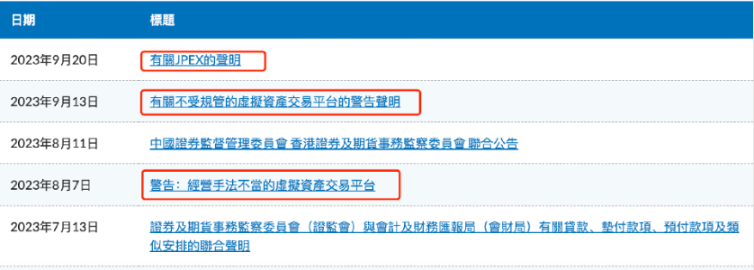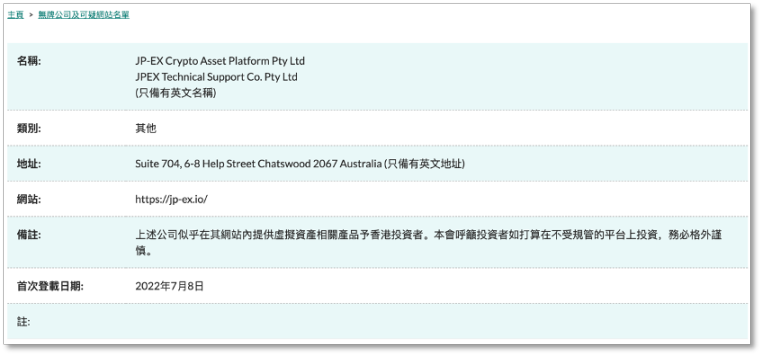Written by: Mu Mu
Edited by: Wen Dao
After the implementation of the Virtual Asset Service Providers (VASP) regime in Hong Kong, the Securities and Futures Commission (SFC), the regulatory authority, has begun to govern the risks of unregulated and suspicious platforms in accordance with the Anti-Money Laundering and Counter-Terrorist Financing Ordinance, which came into effect on June 1.
According to the latest news from the SFC on September 25, the SFC plans to release the "List of Licensed Virtual Asset Trading Platforms," "List of Closed Virtual Asset Trading Platforms," "List of Authorized Virtual Asset Trading Platforms," and "List of Virtual Asset Trading Platform Applicants" to optimize regulation during the transitional period of VASP applications, ensuring transparency of information for investors.
In addition, the SFC will also release a dedicated "List of Suspicious Virtual Asset Trading Platforms" to provide early warnings to the public about risks.
JPEX, which operates for Hong Kong investors, became the first "suspicious virtual asset trading platform" targeted by the SFC.
On September 13, the SFC stated that JPEX, which relies on celebrities and internet celebrities for promotion, made false and misleading statements such as "licensed" and "entered into business cooperation with Hong Kong listed companies," and its entities had not submitted any license applications for virtual asset trading platforms to the SFC. As early as July 2022, the platform was already listed in the SFC's "List of Unlicensed Companies and Suspicious Websites."
After being named by the SFC, JPEX users encountered difficulties in withdrawing funds. According to the Hong Kong police, there have been over 2,000 reported cases involving a total amount exceeding 1.4 billion Hong Kong dollars, and 12 suspects have been arrested. This case has also been referred to as the "largest financial fraud case in history" by the Hong Kong media.
The JPEX incident and the SFC's latest "4+1" list measures have also sounded the alarm for virtual asset trading platforms operating in Hong Kong, urging those seeking to apply for a Hong Kong VASP to abandon "unconventional" promotional methods as soon as possible.
01 SFC Plans to Release "4+1" List to Enhance Transparency
On September 25, the SFC held a press conference, emphasizing once again the need for the public to be vigilant against local unlicensed or suspicious operating platforms. Ashley Alder, the CEO of the SFC, also stated that the existing regulation of virtual asset trading will be optimized.
According to the SFC's statement, the optimization measures include 4 lists of virtual asset trading platforms, namely:
- List of Licensed Virtual Asset Trading Platforms;
- List of Closed Virtual Asset Trading Platforms, which refers to the names of virtual asset trading platforms that are required by law to close within a specified period;
- List of Authorized Virtual Asset Trading Platforms, which refers to the names of virtual asset trading platforms that were authorized until June 1, 2024, and when the license application for a previously licensed virtual asset trading platform is approved, withdrawn, or rejected, the name of the platform will be transferred to the "List of Licensed Virtual Asset Trading Platforms" or "List of Closed Virtual Asset Trading Platforms";
- List of Virtual Asset Trading Platform Applicants
In addition to these 4 lists, the SFC will also release a dedicated list of suspicious virtual asset trading platforms, which will be published on the SFC website for easy access. The SFC will also consider providing more information about unregulated virtual asset trading platforms to enable the public to be vigilant early on, ensuring that information is disseminated in a clear, transparent, and timely manner.
In fact, this "4+1" list measure is an important supplement to the implementation of the Virtual Asset Service Providers (VASP) license in Hong Kong and the one-year transitional period. The SFC has continued to demonstrate its regulatory authority over virtual asset trading after the new policy.
Since June 1, 2022, a new licensing regime for centralized virtual asset trading platforms has been established in Hong Kong. All virtual asset trading platforms operating in Hong Kong or actively promoting their services to Hong Kong investors are required to apply to the SFC for a digital asset license and a Virtual Asset Service Provider (VASP) license.
After the policy was introduced, many virtual asset trading platforms claimed that they "will apply for a VASP license," and the influx of cryptocurrency exchanges into Hong Kong made it difficult for the public to discern which platforms were actually applying for a license and fulfilling their compliance obligations. The SFC has clearly taken note of this and has been issuing risk warnings to the public since August.

The SFC has issued consecutive warning statements
On September 13, JPEX appeared in the SFC's warning statement, becoming the first platform to be named by the SFC as "unregulated" and "suspicious" virtual asset trading platform. This platform was almost the catalyst for the introduction of the "4+1" list measures by the SFC.
02 JPEX Under SFC Surveillance and Exposed After Being Named
For the JPEX trading platform, it may not be unfamiliar to Hong Kong citizens. The platform's advertisements were once widespread in major areas and subway stations in Hong Kong. Hong Kong celebrities such as Zhang Zhi Lin and model Zhuang Simin have endorsed it, and local internet celebrities such as "Coin Young Master" Huang Zhejie and Lin Zuobang have promoted JPEX on social media multiple times.

JPEX advertisements that appeared on the streets of Hong Kong
The active promotion of the platform's services and products to the Hong Kong public through social media influencers and over-the-counter virtual asset currency exchange merchants became one of the reasons why JPEX was targeted by the SFC. It is worth noting that as early as March 2022, this platform had already come under the SFC's scrutiny and was listed in the SFC's "List of Unlicensed Companies and Suspicious Websites" in July of the same year, warning the public that the platform was unregulated.

JPEX was listed in the SFC's "blacklist" as early as July last year
Despite being listed in the "blacklist," JPEX did not cease its operations in Hong Kong. After June 2022, when the SFC obtained regulatory authority over virtual asset trading, it began to take action against JPEX.
On August 7, the SFC officially warned the public about the risks, stating that some unlicensed virtual asset trading platforms falsely claimed to have submitted license applications to the SFC, or misled the public into believing that the trading platform complied with the SFC's regulatory requirements.
On September 13, the SFC directly named the trading platform and clarified that none of the entities under the JPEX Group had been licensed by the SFC, nor had they applied for a license to operate a virtual asset trading platform in Hong Kong. The operating methods of using internet celebrities for promotion were also deemed suspicious, including false claims such as "having obtained licenses to operate virtual asset trading platforms from several overseas regulatory authorities" and "entering into business cooperation with a listed company in Hong Kong and receiving investment," as well as providing "extremely high returns for some products," and complaints from retail investors about "reduced account balances and changes."
In response to this statement, JPEX announced its intention to apply for a license and expressed "extreme disappointment" with the SFC's unfair disruption of market order.
On September 20, the SFC reiterated in a statement that JPEX had not obtained a license, had not applied for a license, and further stated that the trading platform had never contacted the SFC regarding a possible license application, and disclosed that "subsequent information obtained by the SFC raised suspicions of fraud, so it has been referred to the police for handling."
According to reports from Hong Kong media, as of September 23, the Hong Kong police had received over 2,300 cases related to JPEX, involving a total amount exceeding 1.4 billion Hong Kong dollars, and 12 suspects had been arrested, including internet celebrities Lin Zuobang, Chen Yi, and Huang Zhejie, who promoted JPEX and operated over-the-counter exchange shops.
As the confrontation escalated, JPEX users found that it was difficult to withdraw their virtual assets from the platform. Initially, users had to fill out an application form to withdraw funds from JPEX, and some users claimed that the platform limited withdrawal amounts to 1,000 USDT (equivalent to about 1,000 US dollars), while the withdrawal fee was increased to 999 USDT, meaning that users could only withdraw a maximum of 1 USDT.
Users were caught in a "withdrawal difficulty," while JPEX was found to have abnormal large-scale and high-frequency outflows of USDT.
Blockchain data analysis company Bitrace conducted an audit of 2 JPEX fund transfer addresses on the Tron network and found that between September 14 and 20, one transfer address from JPEX transferred 1.5482 million USDT to 11 addresses after 14 days, which was then transferred to multiple trading applications and platforms. During the same period, another transfer address transferred over 7.21 million USDT to 7 addresses, which "part of the funds were neither user withdrawals nor part of the platform's normal business activities, but rather abnormal outflows."
Bitrace's latest on-chain fund audit also pointed out that JPEX-related addresses had received over 190 million risky USDT in the past 20 months, and these risky funds were involved in network gambling, money laundering, and illicit activities.
Individuals involved with JPEX may face criminal liability at the center of the storm.
According to the Hong Kong Anti-Money Laundering and Counter-Terrorist Financing Ordinance, operating and providing virtual asset services without a VASP license after June 1, 2023, constitutes a criminal offense.
If convicted through the public prosecution process, a fine of 5 million Hong Kong dollars and 7 years of imprisonment may be imposed, and for continuous offenses, an additional fine of 100,000 Hong Kong dollars for each day of the offense. If convicted through the summary conviction process, a fine of 5 million Hong Kong dollars and 2 years of imprisonment may be imposed, and for continuous offenses, an additional fine of 10,000 Hong Kong dollars for each day of the offense.
03 Regulatory Thunder Warns License Applicants to Proceed with Caution
From issuing warnings, naming suspicious platforms, to a joint crackdown with the police, the SFC has demonstrated a thunderous attitude towards virtual asset service providers that cross the line. This also sends a signal that platforms operating virtual asset trading in Hong Kong must adhere to the SFC's regulations at all times, and unlicensed exchanges still operating in Hong Kong will face significant risks.
"Investor protection" is a key principle in the specific implementation of SFC regulation.
On September 18, Hong Kong Legislative Council member Wu Jiezhuang held a press conference to respond to the suspected fraud incident involving the virtual asset trading platform JPEX, stating that the incident has had a significant impact on the development of virtual assets in Hong Kong, and the government should do more to protect small investors. On September 19, Hong Kong Chief Executive Carrie Lam also stated that this incident reflects the importance of regulation, including the necessity of choosing to invest in regulated and licensed trading platforms, and investors must also have an understanding of virtual assets and related risks.
Under the new regulatory regime, obtaining a VASP license is not easy, and virtual asset trading platforms need to meet various conditions such as company qualifications, investor protection, anti-money laundering, risk management, internal controls, and network security to obtain a license. Currently, no exchange has obtained a VASP license, and before obtaining this license, they also need to obtain the 1st (securities trading) and 7th (providing automated trading services) licenses issued by the SFC.
According to a previous statement by the SFC, only two virtual asset service providers have obtained both the 1st and 7th licenses, namely OSL Digital Securities Limited and Hash Blockchain Limited.
JPEX's high-profile and controversial promotional strategy has collided with the "gun," and the SFC's joint crackdown with the police carries a sense of "killing the chicken to scare the monkey." The clear stance, attitude, and means have also sounded the alarm for virtual asset trading platforms intending to operate in Hong Kong.
With the implementation of the "4+1 list" measures, the information disclosure of virtual asset trading platforms in Hong Kong will become more comprehensive. It can be foreseen that following the precedent set by JPEX, various virtual asset trading platforms intending to operate compliantly in Hong Kong will maintain a low profile before obtaining a license, and a corner of the cryptocurrency world's wilderness will disappear once again.
免责声明:本文章仅代表作者个人观点,不代表本平台的立场和观点。本文章仅供信息分享,不构成对任何人的任何投资建议。用户与作者之间的任何争议,与本平台无关。如网页中刊载的文章或图片涉及侵权,请提供相关的权利证明和身份证明发送邮件到support@aicoin.com,本平台相关工作人员将会进行核查。




